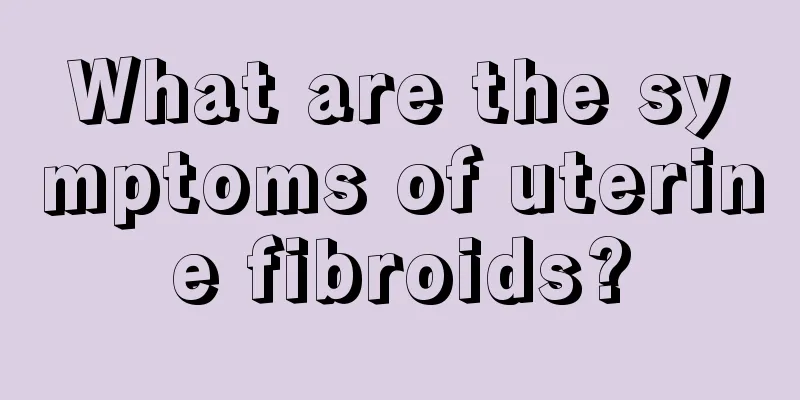What are the symptoms of uterine fibroids?

|
Uterine fibroids are a relatively common gynecological disease. In fact, this disease is quite harmful to women's health, so it must be taken seriously. Generally, this disease can be cured. The more obvious symptom is uterine bleeding, which can cause lumps in the abdomen, and compression reactions that often lead to pain. In addition, it can cause abnormal leucorrhea in women, causing irregular menstruation, and severe cases can lead to infertility. (1) Uterine bleeding It is the most important symptom of uterine fibroids, occurring in more than half of the patients. Among them, cyclical bleeding is the most common, which can manifest as increased menstrual volume, prolonged menstrual period or shortened cycle. It may also present as irregular vaginal bleeding that is not related to the menstrual cycle. Uterine bleeding is more common with submucosal fibroids and intramural fibroids, while subserosal fibroids rarely cause uterine bleeding. (2) Abdominal mass and compression symptoms The fibroids grow gradually, and when they cause the uterus to enlarge beyond the size of a 3-month pregnant uterus or become a larger subserosal fibroid located at the fundus of the uterus, a mass can often be felt in the abdomen, which is more obvious in the early morning when the bladder is full. The mass was solid, movable, and non-tender. When the fibroids grow to a certain size, they can cause compression symptoms of surrounding organs. Fibroids on the anterior wall of the uterus close to the bladder can cause frequent urination and urgency; giant cervical fibroids compressing the bladder can cause difficulty in urination or even urinary retention; fibroids on the posterior wall of the uterus, especially those in the isthmus or posterior lip of the cervix, can compress the rectum, causing difficulty in defecation and discomfort after defecation; giant broad ligament fibroids can compress the ureter and even cause hydronephrosis. (3) Pain Generally speaking, uterine fibroids do not cause pain, but many patients may complain of a feeling of heaviness in the lower abdomen and pain in the waist and back. When the pedicle of subserosal fibroids is twisted or uterine fibroids undergo red degeneration, acute abdominal pain may occur. It is not uncommon for fibroids to be combined with endometriosis or adenomyosis, which may cause dysmenorrhea. (4) Increased vaginal discharge The enlargement of the uterine cavity, the increase of endometrial glands, and the pelvic congestion can cause an increase in leucorrhea. When submucosal fibroids of the uterus or cervix ulcerate, become infected, or necrotic, bloody or purulent leucorrhea will be produced. (5) Infertility and miscarriage Some patients with uterine fibroids suffer from infertility or are prone to miscarriage. The impact on conception and pregnancy outcomes may be related to the growth site, size and number of the fibroids. Giant uterine fibroids can cause deformation of the uterine cavity, hindering the implantation of the gestational sac and the growth and development of the embryo; fibroids compressing the fallopian tubes can lead to obstruction of the lumen; submucosal fibroids can hinder the implantation of the gestational sac or affect the entry of sperm into the uterine cavity. The spontaneous abortion rate in patients with fibroids is higher than that in the normal population, with a ratio of about 4:1. |
<<: What are the symptoms of endogenous wind secretion disorder in women
>>: What are the symptoms of premature delivery during pregnancy?
Recommend
What are the signs of menarche?
Menstruation is a physiological phenomenon that a...
Increased discharge before menstruation
I believe that many women have been troubled by v...
How to do bodybuilding and slimming exercises?
Nowadays, most young people basically work indoor...
Can you still pee properly? So many people have overactive bladders...
Leviathan Press: It is estimated that many people...
What should I do if I get pregnant with a completely septate uterus?
Women with a completely septate uterus generally ...
How should patients with kidney disease eat? Eating and drinking more rationally
1. Low-salt diet Reduce salt intake to no more th...
What's the matter with the small fleshy bumps on the cervix?
Women's health needs to be given special atte...
How to tell if you are pregnant
Pregnancy is something every woman has to go thro...
What are these small particles growing around the eyes?
The skin around the eyes is relatively fragile an...
Why do some people feel very painful during childbirth while others feel very relaxed? What is the relationship between labor pain and
We all know that pregnant mothers will have vario...
World Bipolar Disorder Day丨They are neither geniuses nor crazy...
Today, March 30, is World Bipolar Disorder Day. M...
How to maintain the uterus when a woman is thirty
After the age of 30, a woman's uterus begins ...
Treatment of gynecological pelvic effusion
Pelvic effusion is a type of gynecological diseas...
What color is TF black gold thin tube 28? TF new black gold thin tube 28 lipstick color test
TF Black Gold Slim Tube 28 is a new color number,...
What is malignant invasive hydatidiform mole?
The so-called invasive hydatidiform mole is actua...









